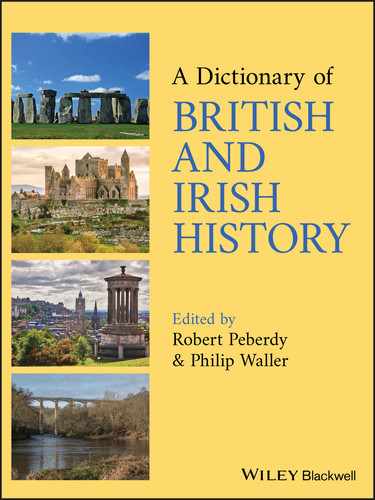Q
- QUADRUPLE ALLIANCE
- An agreement between Great Britain, France, Spain and Portugal, signed 22 April 1834. Designed by Lord PALMERSTON as a liberal counter‐balance to the Holy Alliance (principally Austria, Russia and Prussia), it sought to defeat absolutist pretenders to the Spanish and Portuguese thrones. It succeeded in PORTUGAL.
- QUAKERS
-
Popular name for the Religious Society of Friends, a Christian denomination that eschews clergy, liturgy and formulated creeds. It originated in England in the 1640s with preaching tours by George FOX. His followers, sometimes drawn from ENGLISH REVOLUTION SECTS, were derisively called ‘Quakers’ because they allegedly trembled. In 1652 Fox organized a structure of local meetings (usually monthly), district meetings (quarterly), and national meeting (annual). Women were allowed prominence. Because Quakers refused to acknowledge social superiors, they were seen as subverting social order. They also espoused pacifism.
‘Quakerism’ spread quickly through Britain, and to Ireland (organized by Fox, 1669), Continental Europe and the Americas. Quakers were persecuted until TOLERATION ACTS were passed (England and Wales, 1689; Ireland, 1719). Many Quakers excelled in business. They also campaigned for abolition of the SLAVE TRADE and of SLAVERY in the British Empire (achieved in early 19th century), and in Ireland provided relief (1846–9) during the GREAT FAMINE. In the 1930s Quakers assisted Jewish refugees from Germany. In 2015 there were about 23,000 ‘Friends’ (members and ‘attenders’) in Britain and about 1000 in Ireland. See also PENNSYLVANIA.
- QUANGO
- Acronym used in the UK from the 1970s for ‘quasi‐autonomous non‐governmental organization’. A quango (e.g., Audit Commission, founded 1983) is involved in government while enjoying some independence, although its senior members are usually appointed by a government minister. British CIVIL SERVICE reforms in the 1980s produced more quangos, but the coalition government elected in 2010 pledged to reduce them.
- QUARTER SESSIONS
- see JUSTICES OF THE PEACE
- QUEBEC ACT
- Legislation passed by the British Parliament, April 1774, to provide administrative and other arrangements for the former French province of Quebec (N America), captured in the SEVEN YEARS WAR. It provided an executive government, and guaranteed freedom of worship for Catholics and French legal procedures. The Act angered Protestant opinion in the British colony of MASSACHUSETTS, which associated it with the INTOLERABLE ACTS. See also CANADA.
- QUEENSBERRY, 2ND DUKE OF
- (b. 18 Dec. 1662 at Sanquhar Castle, SW Scotland; d. 6 July 1711 at London, England, aged 48). In 1688–9 James Douglas supported the accession of William of Orange (see WILLIAM III) in place of King JAMES VII/II. Douglas succeeded as duke in 1695 and became a lord of SESSION and keeper of the privy seal, and was KING'S COMMISSIONER (1700), a position he retained under Queen ANNE. He was also a SECRETARY OF STATE from 1702. In 1703–4 Queensberry was implicated in Jacobite plotting and lost his offices, regaining favour in 1705. As commissioner (from 1706) he was pre‐eminent in securing passage of the treaty of Union (1707) and was rewarded with English titles and offices (1708–9). He was nicknamed the ‘Union Duke’. See also JACOBITISM, IMPACT ON BRITISH POLITICS; UNION OF ENGLAND AND SCOTLAND.
- QUEEN’S COMMISSIONER, SCOTLAND
- see KING’S (OR QUEEN’S) COMMISSIONER, SCOTLAND
- QUEENSLAND
- A former British colony in AUSTRALIA. Its area, in NE Australia, was claimed for Great Britain by James COOK in 1770 as part of NEW SOUTH WALES. Used for penal settlement 1825–40 (see TRANSPORTATION), Queensland was opened to free colonists in 1842. It became a separate colony, with RESPONSIBLE GOVERNMENT, in 1859. After a gold rush attracted immigrants (1858–73), the population reached 498,000 in 1901, when Queensland joined the Commonwealth of Australia (see AUSTRALIAN FEDERATION).
- QUIA EMPTORES
- (Latin, meaning ‘Because the buyers’). Name of a statute issued by the English PARLIAMENT in 1290 which permitted freemen to sell or alienate land or tenements freely, with the buyer replacing the seller in relation to a superior lord. It modified feudal landholding by ending the practice of ‘subinfeudation’ whereby a buyer became the tenant of the seller. See also LEGAL REFORMS, ENGLAND, REIGN OF EDWARD I; TENURES, ENGLAND FROM 1066.
- QUO WARRANTO INQUIRIES
- Investigations by the English government 1274–5 into franchises which individuals exercised in England and Wales (e.g., manorial rights) and into the right by which they were claimed. They are so called from the Latin phrase quo warranto (‘by what warrant [or authority]’) which appears in related documents. The investigations were part of efforts by King Edward I to reform justice and increase royal authority in the provinces. See also LEGAL REFORMS, ENGLAND, REIGN OF EDWARD I.
